College of College of Graduate Studies
Unisa hosts conference to address sustainable solutions for ODeL during global crises
Around the world, open, distance and e-learning (ODeL) has come into its own, propelled to the forefront of higher education by the ongoing global pandemic. Unisa, which aspires to be a leader in the global and African ODeL landscape, is hosting its first 2021 ODeL Virtual Conference.
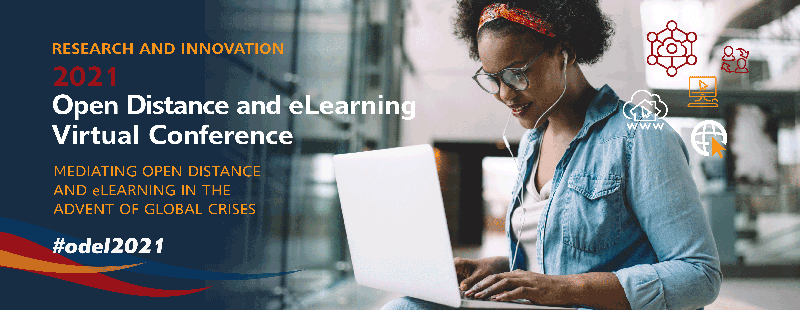 The virtual gathering of scholars, researchers, practitioners and emergent scholars commenced on 4 August and will end on 6 August 2021, under the theme "Mediating open, distance and e-learning in the advent of global crises".
The virtual gathering of scholars, researchers, practitioners and emergent scholars commenced on 4 August and will end on 6 August 2021, under the theme "Mediating open, distance and e-learning in the advent of global crises".
The current global health crisis has precipitated unprecedented disruption in the higher education sector, but it is not the only crisis facing the world. The pandemic has exposed a myriad of other crises that have been hiding in plain sight, such as the persistent inequities that millions of people encounter in attempting to access various socioeconomic opportunities, including opportunities to acquire higher education.
Unisa believes that ODeL has the potential to contribute to redressing these and other inequities, provided ODeL institutions focus candidly and resolutely on quality, improved teaching and learning, and optimal faculty and support structures to support their students’ success.
Directing the programme on the first day of the conference, Prof Paul Prinsloo, Research Professor in Open Distance Learning, Department of Business Management at Unisa said: "The purpose of the 2021 e-conference is to generate debate and consider practical and sustainable solutions for ODeL teaching, learning and research in times of global crises, using pre-conference workshops, plenary sessions and breakaway sessions to explore the theme and various subthemes."
The devastation caused by Covid-19
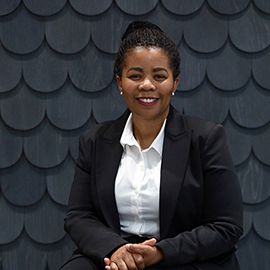
Prof Puleng LenkaBula, Principal and Vice-Chancellor, Unisa
In her welcome address, Prof Puleng LenkaBula, Principal and Vice-Chancellor (VC), Unisa, said: "The devastation caused by Covid-19 has and will continue to challenge us to become innovative and open to existing advantages to be extracted from technological offerings." The VC stressed that the onset of Covid-19 affirmed the importance of the open distance e-learning system as a modality to avail higher education to many people as well as to coping in times of crisis.
She expressed further that Unisa is proud that it is able to adapt quickly to increased online demands. The first of their kind online exams that were successfully conducted last year, for example, proved Unisa’s agility, even more so because the university serves over 400 000 students around the world. "We will continue to be agile during and in the aftermath of the crisis. We continue to explore and invest in appropriate technologies to enhance our teaching, learning and scholarship," said LenkaBula.
Apart from being agile, LenkaBula said that Unisa also opened itself to learning about the impact of the crisis such as the pandemic. "One of the lessons we learnt is that institutions may be exposed to disruptive episodes in and through the development of technologies as well as introducing themselves equally disruptive modes of operations." She added further that as institutions adapt to the new normal, they should ensure that they close the gap between rich and poor students. "At Unisa, this is what we are committed to doing through various interventions, one being the provision of laptops and data to students who deserve financial support," said the VC.
She added further that: "As we navigate through these uncharted waters as the higher education sector, let’s do so with one resolve - making our institutions accessible and making the student experience one that will open a door for them to enjoy a vista that generations before could not enjoy." LenkaBula also stressed that while the crisis has presented challenges, it also offers opportunity to come up with innovations in higher education. "We dare not fail to take up these opportunities. We need to accelerate our uptake of the Fourth Industrial Revolution to accelerate our impact in research, innovation, teaching, learning and engaged scholarship," concluded LenkaBula.
Exploring opportunities for renewal and reinvigoration
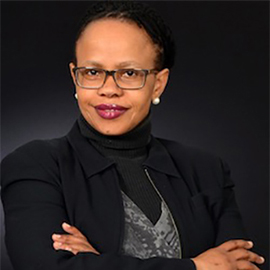
Prof Thenjiwe Meyiwa, Vice-Principal: Research, Postgraduate Studies, Innovation and Commercialisation
Prof Thenjiwe Meyiwa, Vice-Principal of Research, Postgraduate Studies, Innovation and Commercialisation, agreed with LenkaBula: "In today’s era of volatility, there’s no other way but to reinvent. The only sustainable advantage you can have over others is agility. This is the crux of this conference - transforming through and with technology," stressed Meyiwa.
She added that Unisa is not an institution to rest on its laurels. "It has never been more important than now for the university to explore opportunities for renewal and reinvigoration. The past year has been a time of crisis for higher education institutions globally, regionally and locally, and particularly for their students, whose efforts to improve their skills, qualifications, and employability have been thrown into disarray by a pandemic that has turned lives upside down," said Meyiwa.
Unisa, Africa’s oldest and largest open distance learning institution has more experience than most in the art - and science - of distance delivery. That experience has been an asset in this "new normal" of social distancing. "Yet even Unisa has had to make some adjustments," she emphasised.
The relevance of distance education
The first of the conference keynotes was delivered by Dr Sanjaya Mishra, Education Specialist: eLearning at the Commonwealth of Learning, Canada. Mishra premised his address on the historical perspective of open distance learning and proceeded to reflect on the context of contemporary developments and the relevance of distance education. He noted primarily that the Covid-19 pandemic forced the educational community to embark on emergency remote teaching, which is a temporary shift of instructional delivery to an alternate delivery mode due to crisis circumstances.
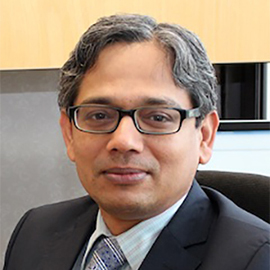
Dr Sanjaya Mishra, Education Specialist: eLearning, Commonwealth of Learning, Canada
He added: This also means some remote teaching solutions are used to deliver the courses, whether it was initially face-to-face or blended or hybrid. As such, these courses used synchronous technologies and replicated classroom pedagogies and were not expected to be like robust online or distance education courses - planned, designed and deliberate.
While Mishra said most of these offerings have characteristics of distance education, he argues that "in principle, they would not necessarily qualify as distance education. One such principle is that course design in distance education follows the deliberate practice to understand learner access to technology and accordingly use a mix of media to deliver teaching and learning. During the pandemic, there was no opportunity for analysis and, instead of increasing access, online learning exacerbated the inequities already present in the system," he said.
Mishra concluded that open distance education institutions have to reflect whether they are using the advantage of distance education to promote equity and making education accessible to the marginalised.
#odel2021
* By Tshimangadzo Mphaphuli, Senior Journalist, Department of Institutional Advancement
Publish date: 2021-08-05 00:00:00.0


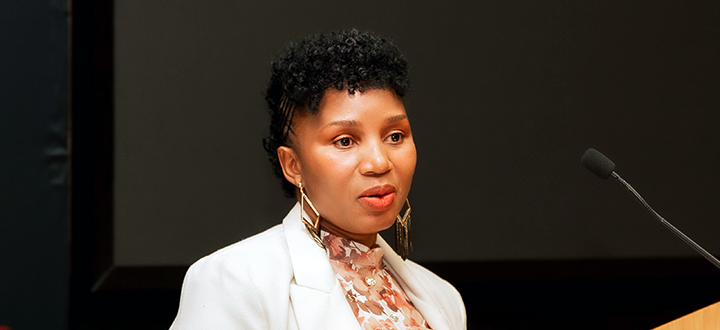 Wings of opportunity: Bringing drones into the classroom
Wings of opportunity: Bringing drones into the classroom
 Visionary youth champion to address Unisa’s Innovation Festival
Visionary youth champion to address Unisa’s Innovation Festival
 Finding the strength to persevere
Finding the strength to persevere
 Disability awareness at Unisa: Disability is not inability
Disability awareness at Unisa: Disability is not inability
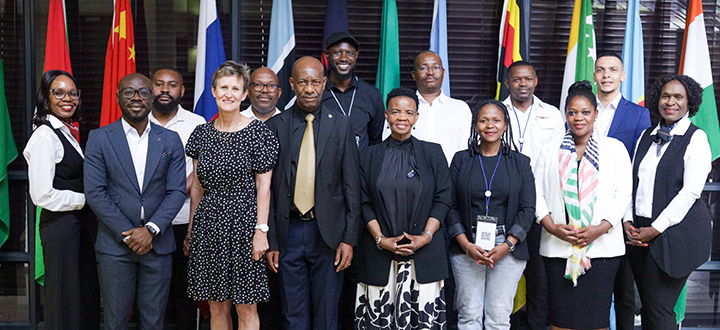 Unisa symposium shares knowledge on building SA's aviation economy
Unisa symposium shares knowledge on building SA's aviation economy